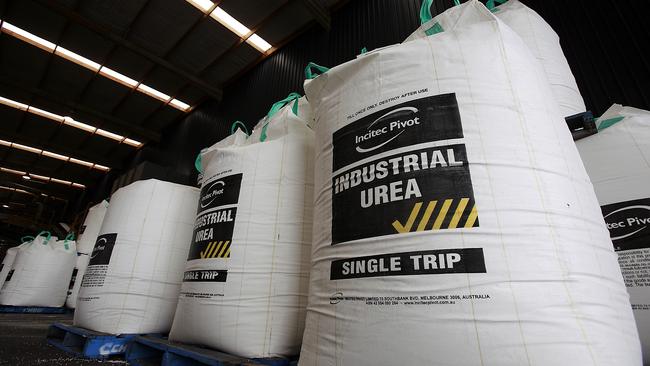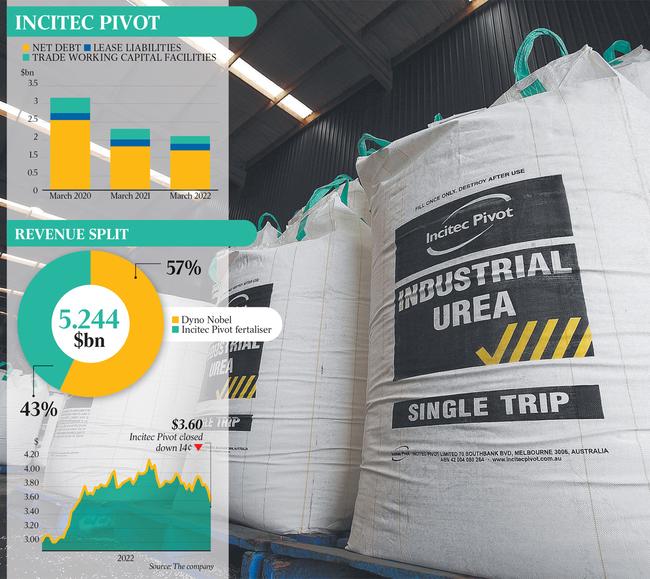
Incitec Pivot has finally moved on its plan to distance itself from its fertiliser operation, but it is by way of a demerger instead of a sale as planned about two years ago.
UBS and Macquarie Capital are working on the split along with law firm King & Wood Mallesons and investors are backing the move despite the stock closing down 3.74 per cent with the soaring earnings not as high as some thought they could be.
The $7.3bn company joins a number of others to have moved on a demerger plan – these include takeover targets GrainCorp, with its spin-off of United Malt, and Tabcorp, which demerged its wagering unit after being targeted by Entain and Apollo.
Then there is AGL Energy, which has opted to demerge its coal fired power operations after poor performance.
But the key difference is that others have been due to poor performance or because they are in the cross hairs of a suitor.
Incitec Pivot’s earnings have been booming on the back of sharply rising fertiliser demand as evidenced by its half year result handed down on Monday.

It saw its half year net profit soar 955 per cent to $384.1m and now accounts for about 62 per cent of earnings so when it comes to divesting the unit it is now or never.
Fertiliser remains in short supply globally with Ukraine, being one of the biggest exporters of ammonia, a key ingredient, being hamstrung by war.
Parties are not thought to have been circling Incitec Pivot lately and the thinking is that the demerger is happening due to no buyers willing to meet the group’s price expectations for the fertiliser unit.
After plans were afoot in 2019 to demerge the country’s largest fertiliser business, it was retained when offers did not meet the company’s expectations.
Incitec Pivot will persist with plans to shut down its fertiliser manufacturing plant at Gibson Island, Queensland which comes due to the inability to secure affordable gas over the long term from Australian producers.
A focus for the company now is its green ammonia feasibility study at Gibson Island to potentially re-purpose the site for the future.
It has announced a partnership with Fortescue Future Industries to carry out a feasibility study into industrial-scale manufacturing of green ammonia conversion from renewable hydrogen at Gibson Island.
The company believes the time is right to embark on the move, with debt levels low and huge product demand from its Phosphate Hill plant in Queensland.
Its ammonia plant at Waggaman in Louisiana forms part of its Dyno Nobel explosives unit is generating strong results.
It believes a separation would allow each unit to better focus on its technology needs at a time the synergies with its explosives chemicals arm, Dyno Nobel, are declining.
Incitec Pivot undertook a transformational acquisition in 2008 to forge deeply into the market when it purchased Dyno Nobel for $3.3bn and it is the second largest provider of explosives products and services in the world.
Its fertiliser unit comprises the distribution and manufacture of fertilisers.
It has an Australian Bio Fertilisers unit, along with its most valuable asset Phosphate Hill, the Gibson Island plant, operations at Geelong and an extensive distribution network.
Dyno Nobel is expected to retain all bank facilities and bonds outstanding at separation and anticipates the continuation of an investment-grade credit rating.
One off costs are expected to be between $80m to $105m and ongoing costs are expected to be about $25m to $35m.
The company is targeting the first half of 2023 for the demerger to occur.




To join the conversation, please log in. Don't have an account? Register
Join the conversation, you are commenting as Logout